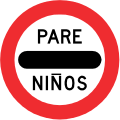Road signs in Chile
Chile is a signatory to the Vienna Convention on Road Signs and Signals, and therefore its signs are compliant with international standards. Chile uses yellow diamonds for warning signs in common with most of the rest of the Americas. Speed limit signs are a red circle with a white background and the limitation in black, and are in kilometres per hour. There are also some signs unique to Chile. Chile also currently uses a mixture of both types of mandatory signs.
Chile drives on the right.
Road Signs (Señales Reglamentarias)
Priority signs (Señales de Prioridad)
The priority section includes three signs: Give Way, Stop, and Stop for Children. The give way sign indicates to drivers that they must slow down and give way to vehicles on the approaching road, but that they do not need to stop if there is enough room to join or merge. The stop sign indicates to drivers that they must come to a complete stop before joining the approaching road, and is reserved for situations where a raised risk of an accident exists if drivers were not to fully stop before proceeding. The stop for children sign is used by crossing guards, and indicates to drivers that they must come to a complete stop and wait while children cross the road.
Prohibitory signs (Señales de Prohibición)
The prohibition section includes signs that are used to prohibit and limit certain vehicles from using the road or from making certain movements/actions. Prohibitions are indicated by a red circle with a 45 degree slash from left to right.
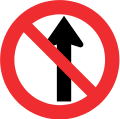 Do not enter
Do not enter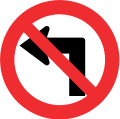 No left turn
No left turn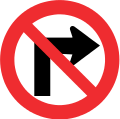 No right turn
No right turn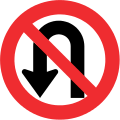 No U-turn
No U-turn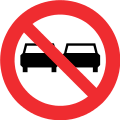 No overtaking
No overtaking No changing lanes
No changing lanes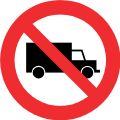 No trucks
No trucks No motor vehicles
No motor vehicles No buses
No buses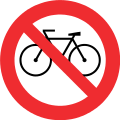 No cyclists
No cyclists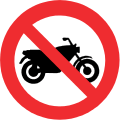 No motorcycles
No motorcycles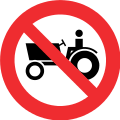 No tractors or other slow-moving vehicles
No tractors or other slow-moving vehicles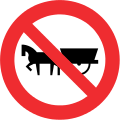 No horse-drawn vehicles
No horse-drawn vehicles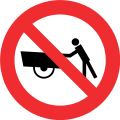 No carts
No carts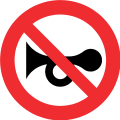 No honking
No honking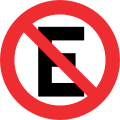 No parking
No parking Disabled parking only
Disabled parking only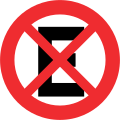 No stopping or parking
No stopping or parking No pedestrians
No pedestrians No stopping on the checkered pavement (usually to keep intersections clear)
No stopping on the checkered pavement (usually to keep intersections clear)
Señales de Restricción
The restriction section includes signs that are used to limit the use of the road based on certain characteristics of the road itself, such as limited height. This section also includes the "end of prohibition or restriction" sign which marks the end of any prohibitions and restrictions of the road.
.svg.png) Maximum speed limit (50 km/h)
Maximum speed limit (50 km/h).svg.png) Minimum speed limit (40 km/h)
Minimum speed limit (40 km/h)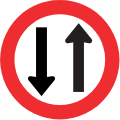 Two-way traffic
Two-way traffic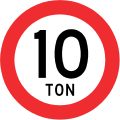 Weight restriction (10 tonnes (11 short tons))
Weight restriction (10 tonnes (11 short tons))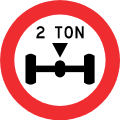 Weight restriction (2 tonnes per axle)
Weight restriction (2 tonnes per axle)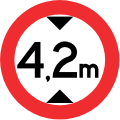 Height restriction (4.2 metres (14 ft))
Height restriction (4.2 metres (14 ft))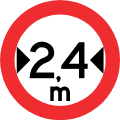 Width restriction (2.4 metres (7.9 ft))
Width restriction (2.4 metres (7.9 ft))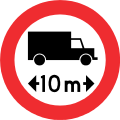 Length restriction (no vehicles over 10 metres (33 ft) long)
Length restriction (no vehicles over 10 metres (33 ft) long) End prohibition or restriction (in this case, the overtaking prohibition has ended)
End prohibition or restriction (in this case, the overtaking prohibition has ended) Toss pass for electronically tagged vehicles only
Toss pass for electronically tagged vehicles only
Mandatory signs (Señales de Obligación)
The obligation section includes signs directing road users to directions and actions they must take or obey. This includes marking one-way streets, mandatory turns and lane control.
 One-way street (leftwards)
One-way street (leftwards) One-way street (rightwards)
One-way street (rightwards) Two-way street
Two-way street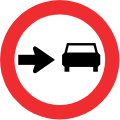 Keep right
Keep right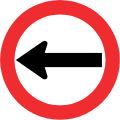 Turn left only
Turn left only Turn right only
Turn right only Give preference to vehicles coming from opposite direction (used at traffic bottlenecks)
Give preference to vehicles coming from opposite direction (used at traffic bottlenecks)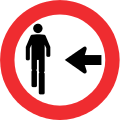 Pedestrians walk on your left
Pedestrians walk on your left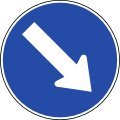 Pass on right
Pass on right Pass on left
Pass on left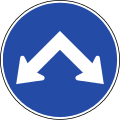 Pass on either side
Pass on either side Stop for customs checkpoint
Stop for customs checkpoint Snow chains mandatory
Snow chains mandatory Cyclists only
Cyclists only Headlights required
Headlights required Motorcycles only
Motorcycles only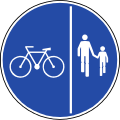 Pedestrians and cyclists keep your side on path
Pedestrians and cyclists keep your side on path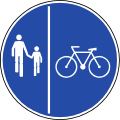 Pedestrians and cyclists keep your side on path
Pedestrians and cyclists keep your side on path Buses only in right lane
Buses only in right lane Buses only in left lane
Buses only in left lane
Señales de Autorización
The authorization section includes signs informing road users of actions that are allowed.
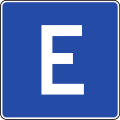 Parking permitted
Parking permitted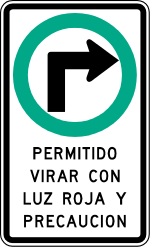 Right turn on red light permitted with caution
Right turn on red light permitted with caution
Warning signs (Señales de Advertencia de Peligro)
Señales de Advertencia sobre Características Geométricas de la Vía
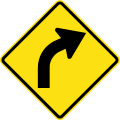 Gentle curve to right
Gentle curve to right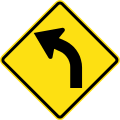 Gentle curve to left
Gentle curve to left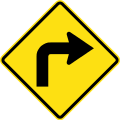 Sharp curve to right
Sharp curve to right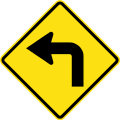 Sharp curve to left
Sharp curve to left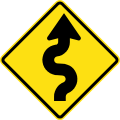 Series of curves, first to right
Series of curves, first to right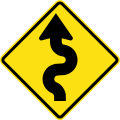 Series of curves, first to left
Series of curves, first to left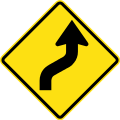 Gentle reverse curve to right
Gentle reverse curve to right Gentle reverse curve to left
Gentle reverse curve to left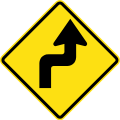 Sharp reverse curve to right
Sharp reverse curve to right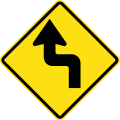 Sharp reverse curve to left
Sharp reverse curve to left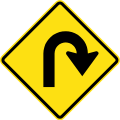 Hairpin curve to right
Hairpin curve to right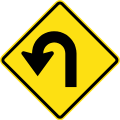 Hairpin curve to left
Hairpin curve to left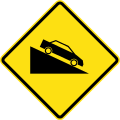 Steep descent
Steep descent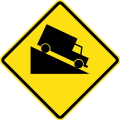 Steep descent
Steep descent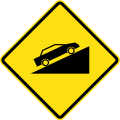 Steep ascent
Steep ascent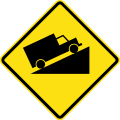 Steep ascent
Steep ascent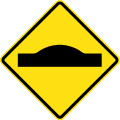 Road bump
Road bump Uneven road ahead (with distance in metres)
Uneven road ahead (with distance in metres)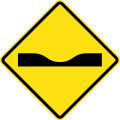 Road dip
Road dip
Señales de Advertencia sobre Restricciones Físicas de la Vía
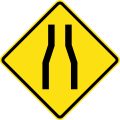 Road narrows ahead on both sides
Road narrows ahead on both sides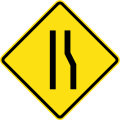 Road narrows ahead on right side
Road narrows ahead on right side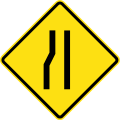 Road narrows ahead on left side
Road narrows ahead on left side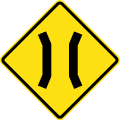 Narrow bridge
Narrow bridge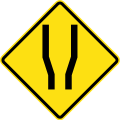 Road widens ahead on both sides
Road widens ahead on both sides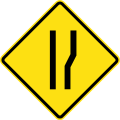 Road widens ahead on right side
Road widens ahead on right side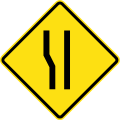 Road widens ahead on left side
Road widens ahead on left side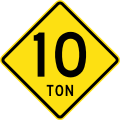 Weight restriction ahead (10 tonnes (11 short tons))
Weight restriction ahead (10 tonnes (11 short tons))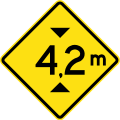 Height restriction ahead (4.2 metres (14 ft))
Height restriction ahead (4.2 metres (14 ft))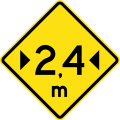 Width restriction ahead (2.4 metres (7.9 ft))
Width restriction ahead (2.4 metres (7.9 ft))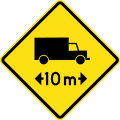 Length restriction ahead (vehicles over 10 metres (33 ft) long)
Length restriction ahead (vehicles over 10 metres (33 ft) long)
Señales de Advertencia Intersecciones con Otras Vías
 Railway crossing ahead without gates or barriers
Railway crossing ahead without gates or barriers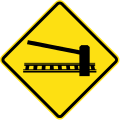 Railway crossing ahead with gates or barriers
Railway crossing ahead with gates or barriers Railway crossing
Railway crossing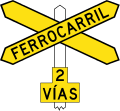 Railway crossing with multiple tracks
Railway crossing with multiple tracks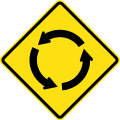 Roundabout ahead
Roundabout ahead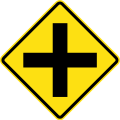 Crossroads ahead
Crossroads ahead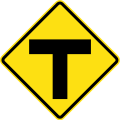 T-junction ahead
T-junction ahead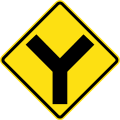 Y-junction ahead
Y-junction ahead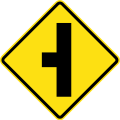 Minor road ahead on left
Minor road ahead on left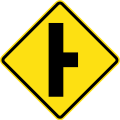 Minor road ahead on right
Minor road ahead on right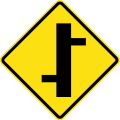 Staggered crossroads, first to the left
Staggered crossroads, first to the left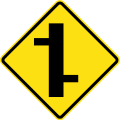 Staggered crossroads, first to the right
Staggered crossroads, first to the right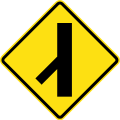 Added lane on left
Added lane on left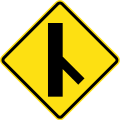 Added lane on right
Added lane on right
Señales de Advertencia sobre Características Operativas de la Vía
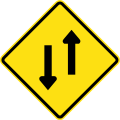 Two-way traffic ahead
Two-way traffic ahead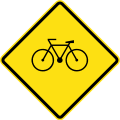 Watch for cyclists
Watch for cyclists Watch for tractors and other slow-moving vehicles
Watch for tractors and other slow-moving vehicles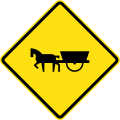 Watch for horse-drawn vehicles
Watch for horse-drawn vehicles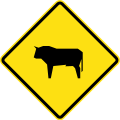 Watch for farm animals
Watch for farm animals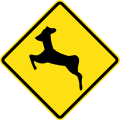 Watch for wild animals
Watch for wild animals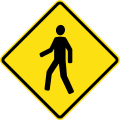 Watch for pedestrians
Watch for pedestrians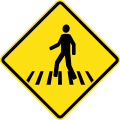 Pedestrian crossing
Pedestrian crossing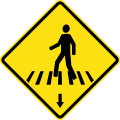 Pedestrian crossing
Pedestrian crossing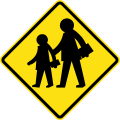 School zone
School zone Watch for children playing
Watch for children playing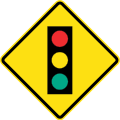 Traffic signals ahead
Traffic signals ahead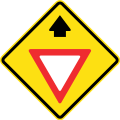 Give Way sign ahead
Give Way sign ahead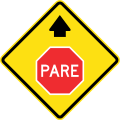 Stop sign ahead
Stop sign ahead
Señales de Advertencia sobre Situaciones Especiales
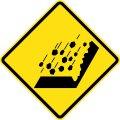 Watch for falling rocks
Watch for falling rocks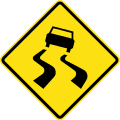 Slippery road
Slippery road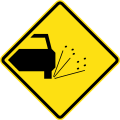 Loose road surface
Loose road surface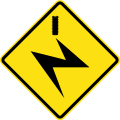 Danger of electrical wires
Danger of electrical wires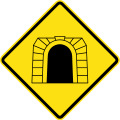 Tunnel
Tunnel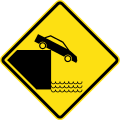 Unprotected riverbank or quayside
Unprotected riverbank or quayside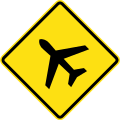 Airport or airfield nearby
Airport or airfield nearby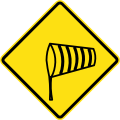 Dangerous wind gusts
Dangerous wind gusts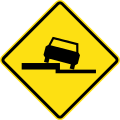 Uneven road
Uneven road Other danger
Other danger
Señales de Advertencia de Trabajos
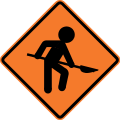 Road workers ahead
Road workers ahead End of road workers
End of road workers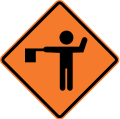 Traffic flagger ahead
Traffic flagger ahead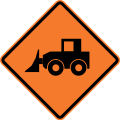 Watch for construction vehicles
Watch for construction vehicles
Informative Signs
 Alternative route
Alternative route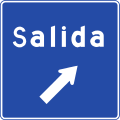 Exit (Type A)
Exit (Type A) Exit (Type B)
Exit (Type B).svg.png) Countdown beacon to next exit (100 meters away)
Countdown beacon to next exit (100 meters away).svg.png) Countdown beacon to next exit (200 meters away)
Countdown beacon to next exit (200 meters away).svg.png) Countdown beacon to next exit (300 meters away)
Countdown beacon to next exit (300 meters away)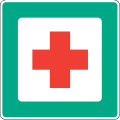 First aid (Type A)
First aid (Type A)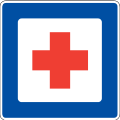 First aid (Type B)
First aid (Type B) Information (Type A)
Information (Type A) Information (Type B)
Information (Type B) Telephone (Type A)
Telephone (Type A) Telephone (Type B)
Telephone (Type B)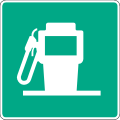 Petrol (Type A)
Petrol (Type A)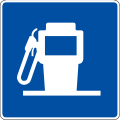 Petrol (Type B)
Petrol (Type B) Post office (Type A)
Post office (Type A) Post office (Type B)
Post office (Type B)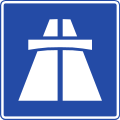 Begin motorway
Begin motorway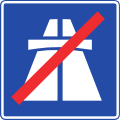 End motorway
End motorway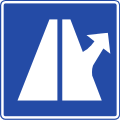 Exit
Exit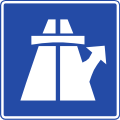 Exit ahead
Exit ahead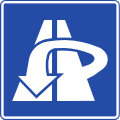 Return route
Return route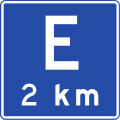 Parking ahead
Parking ahead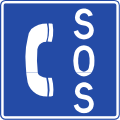 Emergency telephone
Emergency telephone
References
| Wikimedia Commons has media related to Road signs in Chile. |
Manual de Señalización de Tránsito, Capítulo 2 (PDF), Comisión Nacional de Seguridad de Tránsito, retrieved 2019-08-04 Introducción Al Manual De Señalización De Tránsito (PDF), Municipalidad de Punta Arenas, retrieved 2019-08-04


